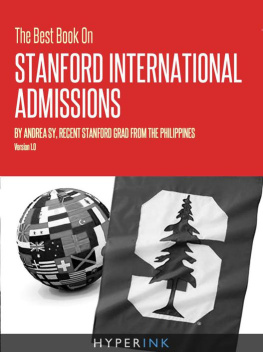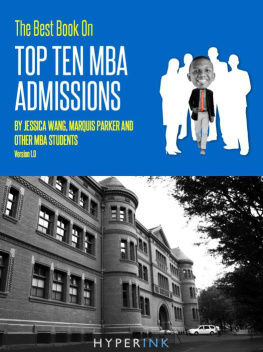Why U.S. Universities
To many Asian parents, U.S. universities are the ultimate dream for their kids.
Why U.S. Universities?
When I was thirteen, I watched my cousin get to the top of her high school class with a clear goal of getting into a college in the United States. Her plan was successful. By the time her high school senior year rolled around, she had secured acceptance letters from many prestigious universities in the U.S.: Harvard, Princeton and Yale. I wanted that kind of future for myself.
To many Asian parents, U.S. universities are the ultimate dream for their kids. Not only are U.S. universities consistently ranked at the top of every world ranking, the prestige and the quality of education that comes with it seems to guarantee a golden future. Thats why when I saw how my entire family supported my cousin the first of the Sy family to get into HarvardI knew how deeply my family valued education.
Everyone knew what Harvard and Stanford were. And somehow, I knew my family believed a secure future lay ahead for me, if I could get the best education I could possible. Its really prevalent in countries like China, where parents are resorting to extreme measures to help get their kids into a good U.S. university, such as paying exorbitant amounts of money for fraudulent applications, and falsified recommendations letters.
For more information: http://www.chronicle.com/article/Falsification-Is-Common-Among/65946/
Perhaps the main reasons why an international student would want to head off to the West to pursue a college education is the high quality of life and the independence that comes with the education. Students in Asia are beginning to see the benefits of pursuing an education abroad. Upper class families in the Philippines have the means to help their children pursue these goals, as the recent trend in the Philippine market have the rich getting richer and the poor getting poorer.
For more information: http://www.marketmanila.com/archives/income-levels-poverty-in-the-philippines
Economists have also recorded an emerging middle class in Asian emerging markets, with increased consumption for many Asian countries and two-thirds of market expansion coming from China and India.
For more information: http://blog.euromonitor.com/2010/03/emerging-focus-rising-middle-class-in-emerging-markets.html
Its no wonder China surpassed other countries in sending students to the U.S. to study.
http://www.voanews.com/learningenglish/home/China-Passes-India-as-Top-Country-Sending-Students-to-US-108791949.html
The Draw Of A U.S. Education
As a student overall, I was the typical (Chinese for Asian girl, as my Chinese teachers at Stanford were also quick to point out) which meant that I got tongue-tied around my parents, strangers, relatives, teachers practically everyone. I was incredibly reluctant to ask questions in class and do anything on my own. My mother would berate me and say that I needed to learn how to be more independent, and that I needed to learn how to be more like American girls, who did everything by themselves.
Hence, when the time came to apply for universities, they were the most supportive parents I could imagine. They were keen on helping me strengthen my character and prove myself without them watching me and coddling me constantly. Looking back on this, I realize that I made the right decision.
Since starting college in the U.S., Ive become more outspoken and professional, and Ive become a lot wiser in terms of facing the real world. I would have been a different person had I not been given the chance to go to university abroad.
The biggest factor in my decision to apply to a U.S. university was the quality of education specifically the academic programs offered at these universities. The facilities and the staff were known for their contributions in all fields; I wanted to experience being in an institution that valued research and independent study. I wanted to be able to construct my own opinions and actively participate in the learning experience. The fact that U.S. universities value independence and individualism appealed to a sheltered high school student like me.
National Universities
The Philippines has its share of good universities. Quality wasnt an issue for me. However, there were a certain set of pros and cons that I seriously considered before making my final decision:
Pros of Staying in the Philippines:
- Comfort and Proximity to Friends, Family and Resources: The biggest advantage in staying in the Philippines was the proximity to my family and friendssomething I would not have if I chose to go abroad. I wouldnt have to stay in a dorm, since the top universities were within driving distance from my home. Many of my friends were also set on staying in the Philippines for college, so I wouldnt be completely alone, no matter which college I chose to attend. I would also have my parents there to provide me with allowance and a car.
- Familiarity with the Teaching Style: There is a very obvious reason why international students from Asia are significantly shyer and quieter than their U.S counterparts. The style in Asia is very distinct. In lecture, the teacher talks and the students listen. No one is ever inclined to ask a question and coming up with your own arguments is seldom encouraged. Hence, thee would be no adjustment process necessary once you enter college.
- You Can Major in Business! This difference only applies to Stanford and a handful of schools in the U.S. While Stanford undergraduates cant major in business for their undergraduate degree, students in the Philippines can. They have their choice of any Business Management degree they want to pursue. This is especially advantageous for those who want to come out of college with a business degree.
- Lower Cost of Education: Education in the Philippines is relatively cheap. Since the Philippines offers courses in English, most Korean students flock to Philippine universities to learn English. To top it all off, tuition ranges from about $1000- $5000 dollars per year, depending on the school. Compare that with the whopping $50,000 a year that Id have to spend in the U.S. (http://www.4icu.org/reviews/3676.htm,http://www.4icu.org/reviews/3665.htm)
Cons of Staying in the Philippines:
- No Importance Given to Humanities Courses: As a humanities major and an avid history buff, I was very distressed to learn that the humanities like English, History, and Literature were considered lowly majors and undesirable classes in the Phillipines. While there is a considerable rift between technical majors and humanities majors even in the United States, the humanities majors are still held in a higher regard than in Asia.
- Lacking in Advancements in Academia: Since going into academia is highly discouraged in the Philippines, academia has not developed very much. You seldom see people going into further studies here, and hence, most of the courses arent very updated.
- Limited Opportunities After College: I really wanted to explore the world after I graduated from college. I realized that most students who came from Philippine universities were stuck in the Philippines unless you studied to become a nurse. If I went abroad, I would have a higher chance of traveling and working in different countries. To date, Ive studied and worked in Beijing, and I managed to get a job in the United States after I graduated.
- Excessive Reliance on Connections: The one thing that went against my wishes to become independent and experience a lot of things firsthand was the dependence on connections that was very rampant in the Philippines. I didnt want to rely on my parents for everything, from internships to job offers.







